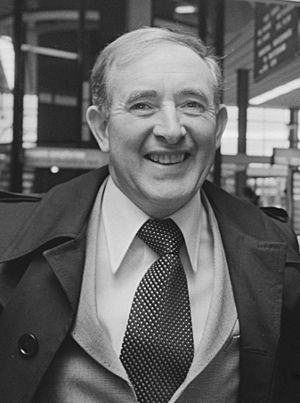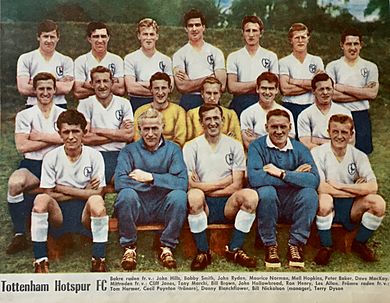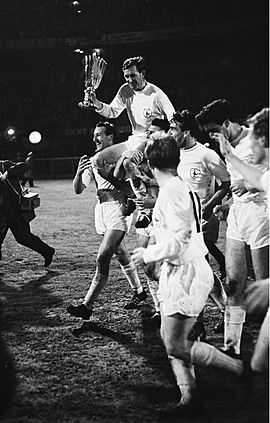Danny Blanchflower facts for kids

Blanchflower in 1976
|
|||
| Personal information | |||
|---|---|---|---|
| Full name | Robert Dennis Blanchflower | ||
| Date of birth | 10 February 1926 | ||
| Place of birth | Belfast, Northern Ireland | ||
| Date of death | 9 December 1993 (aged 67) | ||
| Place of death | Cobham, Surrey, England | ||
| Height | 5 ft 9 in (1.75 m) | ||
| Position(s) | Right-half | ||
| Youth career | |||
| Glentoran | |||
| Senior career* | |||
| Years | Team | Apps | (Gls) |
| 1946–1949 | Glentoran | 124 | (7) |
| 1949–1951 | Barnsley | 68 | (2) |
| 1951–1954 | Aston Villa | 148 | (10) |
| 1954–1964 | Tottenham Hotspur | 337 | (15) |
| 1961 | → Toronto City (loan) | 12 | (3) |
| 1962 | → Boksburg (loan) | 4 | (1) |
| 1965 | Durban City | 3 | (0) |
| Total | 693 | (38) | |
| International career | |||
| 1949–1963 | Northern Ireland | 56 | (2) |
| 1948–1949 | Irish League XI | 4 | (0) |
| Managerial career | |||
| 1976–1979 | Northern Ireland | ||
| 1978–1979 | Chelsea | ||
| *Club domestic league appearances and goals | |||
Robert Dennis "Danny" Blanchflower (born 10 February 1926 – died 9 December 1993) was a famous footballer from Northern Ireland. He is best known for playing for and being the captain of Tottenham Hotspur. He led the team to win both the League and FA Cup in the 1960–61 season, a rare achievement called the "Double". In 2009, The Times newspaper called him the greatest player in Tottenham's history.
Blanchflower played as a defensive midfielder. He was known for his amazing passing skills. He could control the speed of the game and was a great leader on the field. After playing for many years, he stopped at age 38. He then became a respected football journalist and later a football manager.
He once said a very famous quote about football: "The great fallacy is that the game is first and last about winning. It is nothing of the kind. The game is about glory, it is about doing things in style and with a flourish, about going out and beating the lot, not waiting for them to die of boredom." This shows he believed football was about playing beautifully, not just winning.
Contents
Danny Blanchflower's Early Life
Danny Blanchflower was born on 10 February 1926 in Belfast, Northern Ireland. He was the first of five children. His mother had played football as a centre-forward on a women's team. He went to Ravenscroft public elementary school. Later, he earned a scholarship to Belfast College of Technology.
He left college early to become an apprentice electrician. This was at Gallaher's cigarette factory in Belfast. In 1943, he joined the RAF by saying he was older than he was. He trained to be a navigator at St Andrews University. There, he developed a lifelong love for golf. In 1945, he went to Canada for more training. By 1946, at age 20, he was back in Belfast. He returned to Gallaher's and was becoming a well-known footballer. His football coach at St Andrews was Jack Qusklay, a former trainer for Celtic and Scotland.
Danny's younger brother, Jackie, was also a Northern Irish international footballer. Jackie played for Manchester United. Sadly, his career ended due to injuries from the Munich air disaster in February 1958.
Danny Blanchflower's Football Career

Blanchflower started his professional career with Glentoran in 1946. In 1949, at age 23, he moved to England. He signed with Barnsley for £6,000. He then transferred from Barnsley to Aston Villa for £15,000 in March 1951. He played 155 games for Aston Villa before moving again in the 1954–55 season.
In 1954, Tottenham Hotspur bought Blanchflower for £30,000. He spent ten years at Tottenham's home ground, White Hart Lane. He played 337 League games and 382 games overall, scoring 21 goals. The most exciting part of his time at Spurs was the 1960–61 season. With Blanchflower as captain, Spurs won their first 11 games. This was a record for English top-flight football. They eventually won the league by 8 points. Then, they beat Leicester City in the FA Cup final. This made them the first team in the 20th century to win the League and Cup double. This had not been done since Aston Villa in 1897.
Blanchflower was voted FWA Footballer of the Year twice, in 1958 and 1961. This award goes to the best player in English football.

In 1962, he helped Spurs win the FA Cup again. He scored a penalty in the final against Burnley. In 1963, he captained his team to victory. They beat Atlético Madrid in the final of the European Cup Winners' Cup.
While playing for Spurs, he also had a short time with Toronto City. He played there with other famous players like Stanley Matthews and Johnny Haynes.
Danny Blanchflower also played for his country, Northern Ireland. He made his debut in 1949. He played 56 games for Northern Ireland. In 1958, he was captain when his country reached the quarter-finals of the World Cup. In 1962, he became the first Northern Irishman to play 50 international games.
On 4 December 1957, he captained Northern Ireland against Italy in Belfast. This game was very intense and became known as the "Battle of Belfast". Blanchflower tried his best to keep the peace as the game got rough.
He announced his retirement as a player on 5 April 1964, at age 38. He had played almost 400 games for Spurs. He captained them to win four major trophies.
In 1965, Blanchflower briefly returned to play for Durban City in South Africa. He played three games for the club in the National Football League.
Danny Blanchflower as a Manager
After he stopped playing, Blanchflower coached at Spurs for several years. The manager who won the Double, Bill Nicholson, wanted Blanchflower to take over from him. However, when Nicholson left in 1974, Blanchflower was not chosen. Instead, Terry Neill became manager. Blanchflower then left the club. He briefly managed the Northern Ireland team in 1978. After that, he became the manager of Chelsea. But he only won five of his 32 games in charge. He left Chelsea in September 1979.
Life Off the Field
Danny Blanchflower was one of only a few players to win the FWA Footballer of the Year award twice. He won it in 1958 and 1961.
He was one of many people who signed a letter to The Times newspaper in 1958. This letter was against the policy of 'apartheid' in sports. It supported the idea of racial equality in sports. On 6 February 1961, he also became the first person to turn down an invitation to appear on the TV show This Is Your Life. He simply walked away from the host, Eamonn Andrews. This moment was not live on TV, but was being recorded. He explained, "I consider this programme to be an invasion of privacy. Nobody is going to press gang me into anything."
Blanchflower also worked as a football commentator. He commented on a match for ITV as early as 1956. He also hosted parts of the BBC's Junior Sportsview in 1959. In 1967, he was a commentator for CBS television in the United States. He was very honest about the new league's problems, which sometimes upset the TV bosses. He was a regular commentator for Yorkshire Television in the 1968–69 season.
Later Life and Passing
In 1985, Danny Blanchflower appeared in a documentary film called The Keller Instinct. He spoke about his friend, music expert Hans Keller, who supported creative football. Blanchflower stopped writing for the Sunday Express newspaper in 1988.
On 1 May 1990, Tottenham held a special match for him at White Hart Lane. By this time, he was starting to show signs of health issues. He was later diagnosed with Alzheimer's disease and Parkinson's disease. He passed away in a nursing home in Cobham on 9 December 1993, at the age of 67.
Danny Blanchflower's Legacy
Danny Blanchflower was honored in his hometown of Belfast. The Ulster History Circle placed a blue plaque at 49 Grace Avenue, his childhood home. This plaque recognizes his great achievements in sports.
The Danny Blanchflower Playing Fields in East Belfast were named after him. These fields are owned by Belfast City Council. Plans to improve the site with more professional football facilities began in the mid-2000s. By 2020, construction of a new stadium for Harland & Wolff Welders F.C. was underway in the park. There are also plans for nature trails and community projects.
Awards and Trophies
Tottenham Hotspur
- Football League First Division (League Champions): 1960–61
- FA Cup: 1960–61, 1961–62
- European Cup Winners' Cup: 1962–63
Individual Awards
- FWA Footballer of the Year: 1958, 1961
- FIFA World Cup All-Star Team: 1958
- English Football Hall of Fame: 2003
See also
 In Spanish: Danny Blanchflower para niños
In Spanish: Danny Blanchflower para niños
 | Victor J. Glover |
 | Yvonne Cagle |
 | Jeanette Epps |
 | Bernard A. Harris Jr. |

